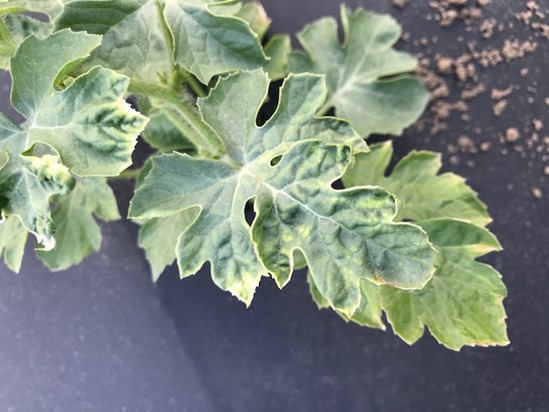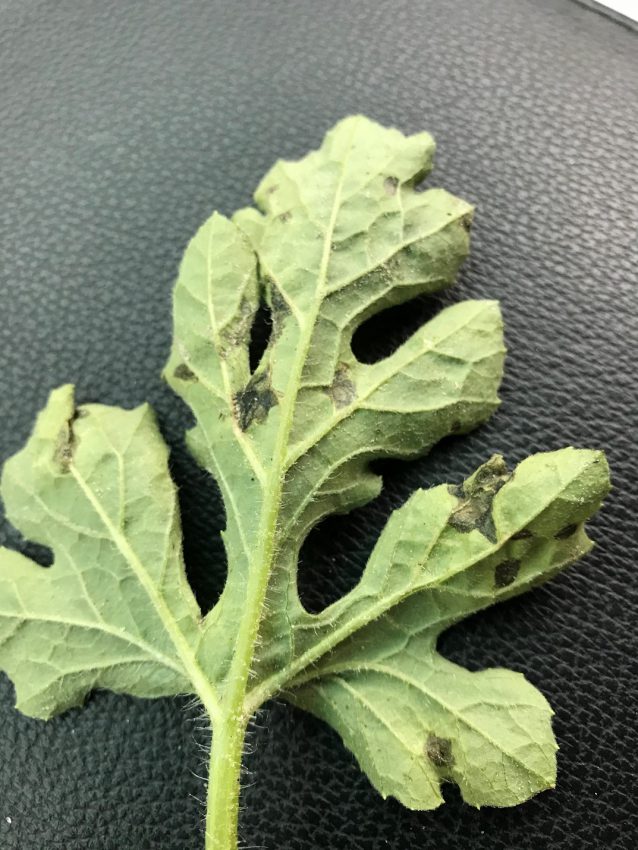Bob Hochmuth, Regional Specialized Extension Agent- Vegetable Crops – Published March 26, 2023
Welcome to the 2023 growing season, weekly issue of the UF/IFAS Extension Suwannee Valley Watermelon Crop Update. These updates are summarized by Bob Hochmuth, Regional Specialized Extension Agent- Vegetable Crops, with input from Suwannee Valley Extension Agents: Mark Warren (Levy), Tyler Pittman (Gilchrist), Tatiana Sanchez (Alachua), Luke Harlow (Bradford), Jay Capasso (Columbia), Dan Fenneman (Madison), Keith Wynn (Hamilton), Emily Beach (Lafayette), Jim Devalerio (Union), De’Anthony Price (Jefferson), Bob Hochmuth (for vacant Suwannee position), Kevin Athearn (RSA-Agri- business), and Sudeep Sidhu (RSA- Water Resources). If you know someone who wants to be added to this weekly notice, contact your Extension Agent or Mark Warren (352-949-8288) if you want to be added to the regional watermelon group text app.
–
Frost and Freeze Damage Assessment
Three mornings in March brought cold temperatures and widespread frost. Official temperatures across the region ranged from 33 to 38° F on all three nights. In most cases we saw typical frost “burn” on leaves, however, in some cases, we also saw other symptoms as a result of damage to the growing points and young unexpanded leaves. In these cases, the newly expanding leaves showed more of a “whitening” of the leaves and growing point that were damaged (see photo below). The fields showing this damage were very recently transplanted, one week before the cold mornings. The plants are quickly recovering from this symptom and the newest growth looks good. In all three frost events, we were very close to much more significant damage, but for the most part the region escaped from major damage. (Bob Hochmuth)
–
Disease Management
The crop generally has looked very clean up to this point. We have seen a couple of cases of bacterial leaf spot, as a result of the cold, rainy weather in the past two weeks. The symptoms (see photo below) include black, wet looking spots with the borders of the spots being very black. In most cases, the incidence of bacterial leaf spot has been very minor and has not warranted a specific treatment. In cases where treatment of bacterial leaf spot is justified, we recommend mancozeb (Manzate, Penncozeb, and other trade names) plus a low rate of copper fungicide. Otherwise, we recommend continuing a weekly Bravo or other chlorothalonil product schedule through the early part of the season, perhaps the first few sprays while we can use chlorothalonil prior to the fruit sizing stage. Banding sprays over the beds only while plants are small is very economical. (Bob Hochmuth)
–
Early Season Nutrient Management
Many farmers are beginning to fertigate in fields where conventional fertilizers were used in the beds. We have widely varying growth stages this year, from just transplanted to setting first fruit. Of course, the rate on N and K recommended varies based on stage of growth. Typically, early season fertigation rates for plants with 18-36 inch long vines will be about 1.5 lbs of N per acre per day (if using 8-0-8, this rate would be about 13 gallons per acre per week). However, your individual farm decision of when to start fertigating and at what rate of N and K can be fine tuned with petiole sap testing or leaf tissue sampling. The immediate information provided by petiole sap testing in the field is the quickest and best way to fine tune your fertigation program. Your Extension Agents in the Suwannee Valley all offer this service at your request.
–
We have initiated a more formal way to support our watermelon growers with a rapid diagnostics system through Suwannee Valley Regional and County Extension Agents. This industry-funded program allows Extension Agents to submit and pay for watermelon grower’s plant disease and other diagnostic samples. This SV Rapid Diagnostic Watermelon Program will help us to get quicker diagnostic results, helping to give early alerts to everyone, and not have to charge the growers directly. Sponsors of this program in 2023 to date include Harrell’s and TriEst Ag.
Those interested in sponsoring can contact Bob Hochmuth at bobhoch@ufl.edu or 386-288-6301.
- 2025 Peanut Field Day Recap & Speaker Handouts - August 29, 2025
- Peanut Foliar Diseases Exploding Across Florida - August 22, 2025
- Provisional Nitrogen Fertilization Recommendation for Florida Cotton for the 2025 Season - June 20, 2025


